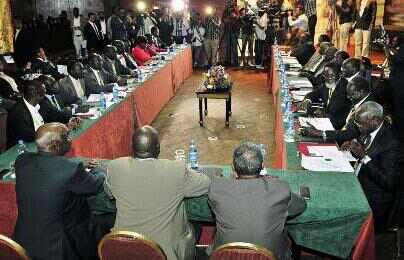S. Sudan government, rebels due to resume talks next week
By Tesfa-Alem Tekle
July 24, 2014 (ADDIS ABABA) – Despite fresh fighting over control of the key town of Nasir, the South Sudanese government and rebels led by former vice-president Riek Machar, will resume peace talks next week, the east African regional bloc mediating negotiations disclosed on Thursday.

“All the stakeholders have reiterated their commitment to the negotiation process, which is tentatively scheduled to commence on 30th July, 2014 to 10th August 2014,” IGAD said in a statement.
IGAD’s decision to recommence talks comes after special envoys of the regional bloc engaged in extensive consultations with various actors and stakeholders of the South Sudanese peace process.
The consultations were aimed at finding a way forward for the stalled talks and focused on finding ways of implementing the resolutions passed during a 10 June IGAD meeting.
During the summit both president Salva Kiir and Machar committed to form a transitional government through an all inclusive peace process.
However both sides failed to cease fire and continued to engage in fresh fighting with both sides trading accusations of violating to terms of the truce.
“The agenda of the next session will be to finalise and sign the Cessation of Hostilities Matrix and negotiation on details of the Transitional Government of National Unity,” the mediation said.
Following the latest fighting, international aid organisations are warning of a growing famine risk which could affect over a million of people displaced by the conflict.
“The essence of stopping the war is to create a conducive environment for negotiations, and to facilitate humanitarian operations to reach the needy populations and pre-empt the looming famine in South Sudan that is likely to affect millions of the displaced populations,” IGAD said.
The slow-moving IGAD led peace process has so far failed to bring a fruitful outcome to end the crisis, with a ceasefire agreement signed in January failing to halt fighting on the ground.
Peace talks had been due to resume in late June, but were adjourned after the rebel delegation boycotted the talks in protest over IGAD’s alleged failure to facilitate travel for stakeholders based outside South Sudan to attend the talks.
In recent interview with Sudan Tribune, Machar voiced concerns over the way IGAD was handling the peace negotiations, including plans to deploy a regional force in South Sudan and the participation of other stakeholders in the process.
Machar also accused the regional bloc of making decisions on behalf of the two warring parties.
“The warring parties should make the decisions. The driving force should not be the IGAD. IGAD should be the moderator. They bring us together since we are willing to come together under the auspices of IGAD, the parties should drive the process,” Machar said.
Political analysts believe that the formation of a transitional government within 60 days as agreed in June is unlikely.
The terms for the implementation of a transitional government of national unity have yet to be negotiated, with the next round of IGAD-led peace talks tasked with overseeing government functions during a transitional period and a permanent constitutional process, as well as the implementation of critical reforms earlier negotiated through the peace process with the aim of guiding the country towards new elections.
(ST)
